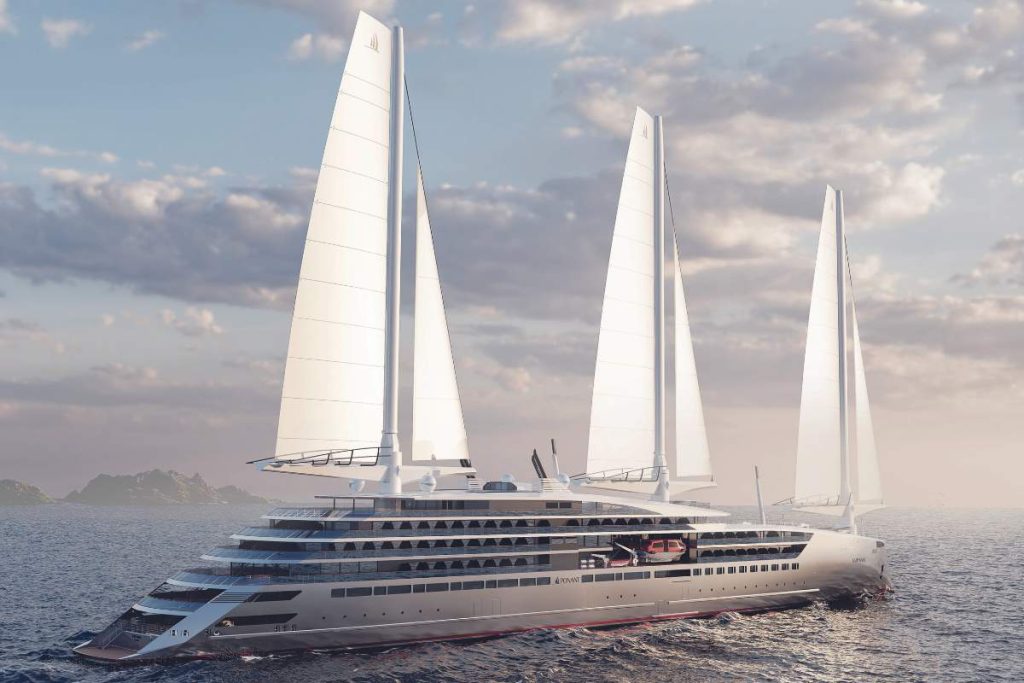Ponant has successfully obtained funding from the European Commission, marking a significant milestone in its endeavour to launch a revolutionary zero-emission cruise ship.
This financial backing is part of the INNOVFUND initiative, which promotes the advancement of renewable energy solutions, aligning with Ponant’s ambitious Swap2Zero project.
Ponant’s Pioneering Environmental Vision
The European Commission’s INNOVFUND has recognised and is supporting Ponant’s Swap2Zero project, which aims to revolutionise cruise travel by introducing the first transoceanic carbon-neutral ship. The funding, supported by the EU Emissions Trading System revenues, facilitates the deployment of innovative low-carbon technologies, making it one of the most substantial global initiatives in this field.
Ponant’s innovative approach includes an exclusive blend of six decarbonisation technologies, each contributing to the ship’s operational autonomy and zero-emission goal. These technologies range from advanced sail power systems to innovative photovoltaic panels, all cohesively designed to harness renewable energy efficiently.
Decarbonisation Technologies at the Core
Ponant’s groundbreaking initiative features a sail power system that, combined with an optimised hull design, will provide half of the ship’s propulsion energy solely from wind power, ensuring significant emission reductions.
In addition to wind energy, the vessel will be equipped with more than 1,000m2 of next-generation photovoltaic panels, all eco-designed and manufactured in France. These panels exemplify the project’s commitment to sustainable energy.
A pivotal component of the Swap2Zero project is a low-temperature fuel cell, utilising liquid hydrogen for propulsion. This technology underscores Ponant’s commitment to integrating cutting-edge solutions for carbon-neutral operations.
Integrated Energy Solutions
The zero-emission ship will also incorporate a high-temperature fuel cell dedicated to meeting the ship’s hotel load needs. This strategy ensures efficient energy use as the heat generated is captured and repurposed for vital functions such as hot water production.
Additionally, onboard carbon capture technology plays a crucial role in Ponant’s energy management strategy. This system, in conjunction with the high-temperature fuel cell, will efficiently control emissions while optimising power distribution without reliance on traditional generators.
This bespoke energy management system reflects Ponant’s holistic approach to energy efficiency, promising a leap forward in maritime sustainability.
Collaborative Efforts and Acknowledgement
Ponant’s Swap2Zero initiative has garnered support not only from the European Commission but also from the French government and BPI, indicated as part of the CORIMER 2023 calls in alignment with France’s 2030 Green Ship roadmap. These collaborations highlight the widespread acknowledgment of the project’s potential impact.
“The grant serves as a robust endorsement of our team’s pioneering efforts in decarbonisation,” stated Patrick Augier, Ponant’s general secretary. Such recognition underscores the innovative spirit and international leadership embedded in Ponant’s operational ethos.
A Vision for the Future
With plans to deploy this zero-emission vessel by 2030, Ponant’s efforts mark a significant stride towards sustainable maritime solutions, setting a benchmark for the cruise industry to follow.
The acknowledgement by prominent industry bodies reaffirms Ponant’s strategic vision, inspiring further advancements in eco-friendly travel technologies.
The Swap2Zero project not only paves the way for future innovations but also stands as a testament to the possibilities when cutting-edge technology and sustainability converge.
Strategic Implications for Maritime Industry
Ponant’s initiative clearly illustrates a transformative shift within the cruise industry towards sustainable operations. By pioneering this comprehensive zero-emission ship, Ponant positions itself as a front-runner in maritime decarbonisation.
The developments in renewable energy technologies featured in the Swap2Zero project serve as a potential catalyst for widespread adoption across the industry, signifying a change in how cruise lines approach environmental responsibility.
Conclusion
Ponant’s ambitious zero-emission cruise initiative, backed by substantial EU funding, represents a crucial step towards sustainable maritime innovation. As the project progresses, it continues to inspire the cruise industry by championing environmental stewardship and technological advancement.
In conclusion, Ponant’s Swap2Zero project, supported by European and French initiatives, signifies a transformative era in cruise travel. The project not only sets a new standard for sustainability but also reinforces Ponant’s leadership in pioneering eco-friendly maritime technology.

